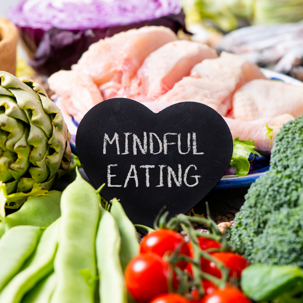The concept of mindfulness has fully saturated mainstream culture at this point. Though it’s more likely to conjure up an image of someone sitting cross-legged with closed eyes than sitting at a table looking wide-eyed at mealtime, it’ll serve you just as well on your dinner plate as it will on your yoga mat.
What is intuitive eating?
Eating mindfully, also known as intuitive eating, is trending in the health and wellness world. But it couldn’t be more different from fad diets or other trends like fasting and cleanses, which have restrictive lists of rules and foods to eat or avoid. Intuitive eating starts by simply tuning in to your body’s needs and cues, but it goes further than that. As a Harvard Medical School article put it, “In essence, mindful eating means being fully attentive to your food — as you buy, prepare, serve, and consume it.” And that includes focusing on how different foods and eating habits make you feel, both physically and mentally.
While this may feel … intuitive ... it’s easier said than done in a culture with consistent and often confusing messaging around what constitutes
healthy eating. Even the tried-and-true method of calorie counting has raised doubts in recent years due to inaccuracies in calorie calculations for the nutrition labels and research on how calorie restriction can backfire by changing your hormone levels and even slowing down your metabolism. Kristen Smith, a registered dietitian and the spokesperson for the Academy of Nutrition and Dietetics, says it’s also linked
to disordered eating habits. Intuitive eating may just be the antidote. Singer Demi Lovato, who has been open about her struggles with an eating disorder and body-image issues, credits a more mindful approach to eating with helping her overcome harmful eating patterns.
How does it lead to better health outcomes?
Having a regular exercise routine and eating well have long been known as the two pillars of physical health. When it comes to the latter, intuitive eating helps you create healthy and sustainable eating habits. The upshot is that when you eat better, you’ll feel better. Being attuned to that connection is the foundation of mindful eating. Most of us know that we should eat whole foods, including lots of fruits and vegetables, but feeling the outcome of increased consumption of these foods will help you stick with and build the habit.

